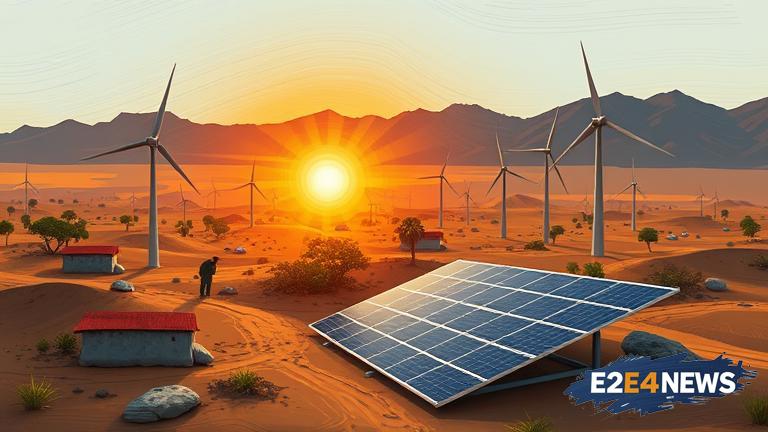The African continent is witnessing a significant shift towards renewable energy, driven by the need to address the pressing issues of energy access, energy security, and climate change. With many countries still relying heavily on fossil fuels, the transition to renewable energy is crucial for sustainable development. According to recent reports, Africa’s renewable energy capacity has increased substantially over the past decade, with solar and wind power leading the charge. This growth is attributed to declining technology costs, improved energy storage, and innovative financing models. Governments across the continent are implementing policies and regulations to support the development of renewable energy, including tax incentives, feed-in tariffs, and net metering laws. The private sector is also playing a vital role, with companies investing heavily in renewable energy projects, such as solar farms and wind parks. In South Africa, for example, the Renewable Energy Independent Power Producer Procurement (REIPPP) program has been instrumental in promoting the development of renewable energy, with over 100 projects awarded to date. Similarly, in Egypt, the government has set ambitious targets to increase the share of renewable energy in the energy mix, with a focus on solar and wind power. Morocco has also made significant strides in renewable energy, with the launch of the Noor-Ouarzazate solar power complex, one of the largest in the world. The benefits of renewable energy are numerous, including reduced greenhouse gas emissions, improved air quality, and enhanced energy security. Moreover, renewable energy can create jobs, stimulate local economies, and contribute to poverty reduction. However, despite the progress made, significant challenges remain, including the need for greater investment, improved infrastructure, and enhanced regional cooperation. To address these challenges, international organizations, such as the African Development Bank and the International Renewable Energy Agency (IRENA), are providing technical assistance, financing, and capacity-building support to African countries. The African Union’s Agenda 2063 also emphasizes the importance of renewable energy in achieving sustainable development and promoting economic growth. In addition, the United Nations’ Sustainable Development Goals (SDGs) recognize the critical role of renewable energy in addressing climate change and ensuring access to affordable and clean energy. As the demand for energy continues to grow, driven by population growth, urbanization, and industrialization, the need for renewable energy will become increasingly important. In this context, African countries must prioritize the development of renewable energy, leveraging international cooperation, technology transfer, and innovative financing mechanisms to achieve a sustainable energy future. The potential for renewable energy in Africa is vast, with estimates suggesting that the continent could generate up to 20% of its energy from renewable sources by 2030. To realize this potential, governments, private sector companies, and civil society organizations must work together to create an enabling environment for renewable energy development, including the development of supportive policies, regulations, and infrastructure. Furthermore, there is a need for greater awareness and education about the benefits of renewable energy, as well as the importance of energy efficiency and conservation. By promoting renewable energy, Africa can reduce its dependence on fossil fuels, mitigate climate change, and achieve sustainable development, ensuring a brighter future for its citizens.
